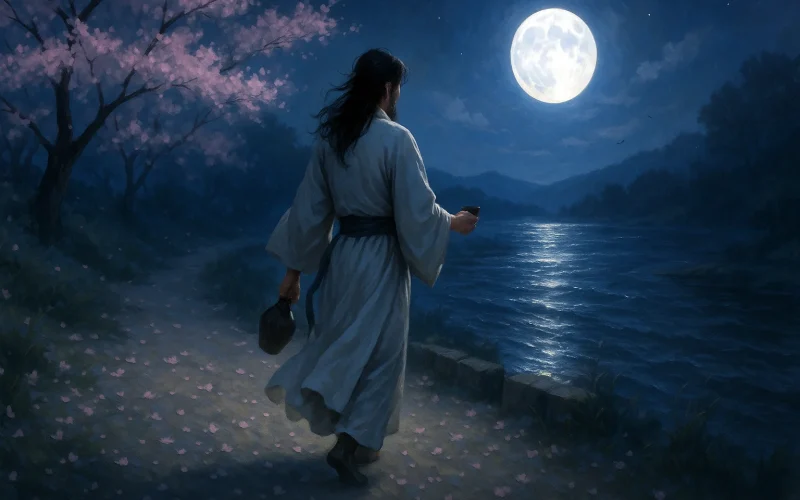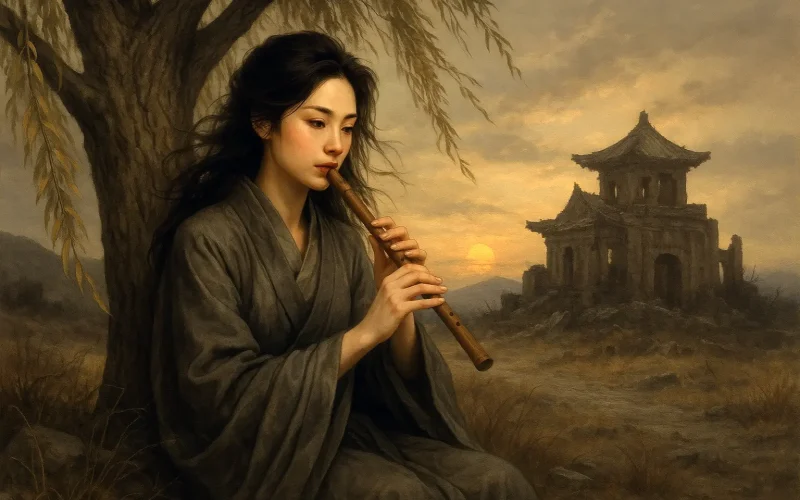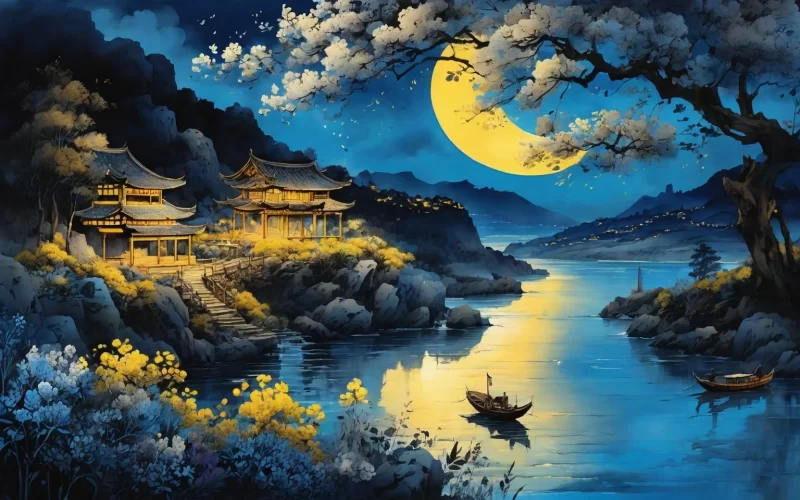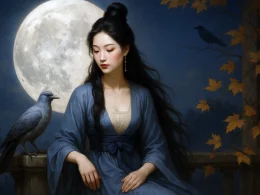With wine I sit until night veils the sky,
Till fallen blossoms pile on my robe high.
Drunk, I rise to stroll in moonlit streams;
Birds homeward fly and few men are seen.
Original Poem
「自谴」
李白
对酒不觉暝,落花盈我衣。
醉起步溪月,鸟还人亦稀。
Interpretation
This poem was composed after a solitary night drinking session, expressing the poet's serene intoxication amidst nature's tranquility. Through nocturnal imagery, it captures the comfort of mild inebriation tinged with subtle melancholy.
First Couplet: "对酒不觉暝,落花盈我衣。"
Duì jiǔ bù jué míng, luòhuā yíng wǒ yī.
Facing wine, unaware of dusk's descent; Fallen blossoms fill my gown.
Immersed in drinking joy, the poet only notices nightfall when darkness descends. "Unaware of dusk" reveals his total absorption, while "blossoms fill my gown" paints an image of drinking beneath flowering trees, petals scattering in the wind—both poetic and faintly lonesome.
Second Couplet: "醉起步溪月,鸟还人亦稀。"
Zuì qǐ bù xī yuè, niǎo hái rén yì xī.
Drunk, I stroll by moonlit streams; Birds return, few people remain.
Wandering intoxicated along moon-reflecting waterways, the poet finds serenity in the deep night's solitude. "Birds return" signals late hour and nature's rest, while "few people remain" emphasizes isolation. The lines construct a translucent quietness, almost palpable with cool breezes and placid moonlight.
Holistic Appreciation
This poem depicts, with delicate imagery, a scene of drinking on a solitary night, conveying both leisurely diversion and the loneliness found within stillness. The first couplet portrays the poet drinking with a companion, immersed in a blossom-strewn atmosphere that evokes a sense of unrestrained joy; the latter couplet shifts to moonlit solitude, where deepening quiet and vanishing company intensify the feeling of isolation and melancholy.
Through imagery of wine, fallen blossoms, stream moons, and returning birds, the poem perfectly blends leisurely comfort with subtle loss. Overall, it reflects both the poet's appreciation for natural beauty and a recluse-like emotion of expressing feelings through landscapes.
Artistic Merits
- Scene-Emotion Fusion, Actual-Virtual Blend: Changing imagery (night, fallen blossoms, stream moons) mirrors emotional shifts, from intoxication to solitude, achieving poignant scene-emotion unity.
- Concise Language, Profound Conception: Four brief lines sketch dusk-to-midnight scenes, balancing dynamic description and static subtlety for lingering charm.
- Layered Progression, Joy-to-Solitude Shift: From "facing wine" to "drunken stroll," from "blossom-filled gown" vibrancy to "few people remain" quietude, emotion transitions joy-to-melancholy, expressing intoxicated wistfulness.
Insights
This poem reveals the poet's mindset of finding solace in nature and accepting circumstances, while conveying solitude's nuanced emotions: comfort in scenic intoxication and mild loneliness in deep-night quiet. For modern readers, it reminds us to appreciate life's quiet beauty amid busyness, finding balance and solace in solitude.
About the poet

Li Bai (李白), 701 - 762 A.D., whose ancestral home was in Gansu, was preceded by Li Guang, a general of the Han Dynasty. Tang poetry is one of the brightest constellations in the history of Chinese literature, and one of the brightest stars is Li Bai.












